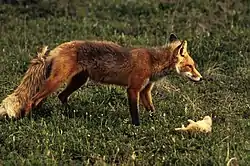lapsa
Latin
Latvian

Lapsa
Etymology
From earlier *lapesa, from Proto-Baltic *lap- (< *wlap-, *wlop-) with an extra element *-eš (< *-eḱ), from Proto-Indo-European *wlp-, *lup-, *lop-, *h₂wl(o)p, *h₂ulp, ultimately from the stem *wel- (“to pluck; to steal, to plunder; to tear”), whence also vilks (“wolf”), q.v.). The original meaning was, as in the case of vilks, also “thief,” “tearer.” Cognates include Latgalian lopsa, Lithuanian lãpė, Old Prussian lape, Sudovian laps, Breton louarn, Ancient Greek ἀλώπηξ (alṓpēx), Sanskrit लोपाशः (lopāśaḥ, “fox, jackal”), Latin volpēs, Scythian raupāsa, Armenian աղվես (ałves), Persian روباه (rubâh).[1]
Noun
lapsa f (4th declension)
- fox (esp. Vulpes vulpes)
- sarkanā lapsa ― red fox
- lapsas āda ― fox skin, fur
- lapsu medības ― fox hunting
- viltīgs kā lapsa ― cunning as a fox
- lapsas ir veikli dzīvnieki, tās labi prot izvairīties no briesmām un iegūt laupījumu ― foxes are crafty animals, they know well how to avoid danger and get prey
- (figuratively) fox, old fox (a cunning person)
- ar ziņojumiem par puiku nemieriem skolu inspektors Valmierā tikai pats grib tikt labākā vietā... vai nu kurators Rīgā lai būtu tāds āpsis un ticētu Valmieras lapsai? ― with reports of unrest among the boys the school inspector in Valmiera only wanted to get a better position... or would the curator in Riga be a badger and believe the Valmieran fox?
Declension
Declension of lapsa (4th declension)
References
- Karulis, Konstantīns (1992), “lapsa”, in Latviešu Etimoloģijas Vārdnīca (in Latvian), Rīga: AVOTS, →ISBN
This article is issued from Wiktionary. The text is licensed under Creative Commons - Attribution - Sharealike. Additional terms may apply for the media files.